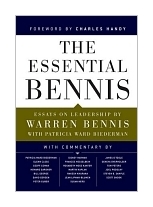|
||
• wydawnictwa polskie
• Zamów informacje o nowościach z wybranego tematu • kontakt
• Cookies na stronie |
THE ESSENTIAL BENNISBENNIS W. WARD BIEDERMAN P.wydawnictwo: WILEY JOSSEY-BASS , rok wydania 2009, wydanie Icena netto: "Looking over a lifetime of work, I see that certain themes have always fascinated me. Early on, I felt that bureaucracy was doomed and that something flatter and more collegial would triumph. The need for candor and transparency has been a frequent cry, because I saw how warped organizations become without them. I've long known that organizational decisions inevitably have a moral dimension. The vital role that great followers play in successful leadership has grown ever more obvious. I am increasingly aware how crucial rhetoric and other performing arts are in making a compelling leader—good or bad. That leaders are inevitably shaped by personal crucibles has been confirmed by hundreds of interviews. And it is clear to me now that the process of becoming a leader and the process of becoming a fully integrated human being are one and the same, both grounded in self-discovery." —from the Introduction by Warren Bennis Warren Bennis is Distinguished Professor of Business Administration and founding chairman of The Leadership Institute at the University of Southern California. He also serves as chairman of the Advisory Board of the Center for Public Leadership at Harvard University's John F. Kennedy School of Government. He is the author or coauthor of numerous books, including On Becoming a Leader, Organizing Genius, Judgment, and Leading for a Lifetime. Table of Contents
Foreword (Charles Handy). Introduction (Warren Bennis). Part 1: My Life as a Leader. An Invented Life: Shoe Polish, Milli Vanilli, and Sapiential Circles (1971, 1993). Martin Kaplan on “An Invented Life”. Berkeley of the East and What Went Wrong (1973). Patricia Ward Biederman on “The Berkeley of the East” and “ What Went Wrong”. Searching for the “Perfect” University President (1971). Steven B. Sample on “Searching for the 'Perfect' University President”. Foreword to The Age of Heretics (2008). Part 2: How Organizations Create or Thwart Leaders. Democracy Is Inevitable (1964, 1990, 1998). Rosabeth Moss Kanter on “Democracy Is Inevitable”. The Coming Death of Bureaucracy (1966, 2000). Tom Peters on “The Coming Death of Bureaucracy”. The End of the Great Man (1997). Scott Snook and Rakesh Khurana on “The End of the Great Man”. The Pornography of Everyday Life (1976). Winning and Losing (1988). Lessons from Larry (2006). When to Resign (1972). A Corporate Fear of Too Much Truth (2002). James O'Toole on “When to Resign” and “A Corporate Fear of Too Much Truth”. March of Folly Redux: Iraq (2003). Part 3: On Becoming a Leader. Learning Some Basic Truisms About Leadership (1989, 1996). Understanding the Basics (1989, 2003). Frances Hesselbein on “Understanding the Basics”. Deploying Yourself: Strike Hard, Try Everything (1989). Judgment Trumps Experience (2007). The Crucibles of Leadership (2004). Susan Nero on “The Crucibles of Leadership”. The Alchemy of Leadership (2002). Howard Gardner on “The Alchemy of Leadership”. Epilogue to the Twentieth-Anniversary Edition of On Becoming a Leader (2009). David Gergen on “Epilogue to the Twentieth-Anniversary Edition of On Becoming a Leader”. Part 4: Leadership as Performance. The Seven Ages of the Leader (2004). Sidney Harman on “The Seven Ages of the Leader”. The Leader as Storyteller (1996). Peter Guber on “The Leader as Storyteller”. Leadership as a Performing Art (2002). Glenn Close on “Leadership as Performing Art”. Part 5: Cultivating the Leader in Others. The Challenges of Leadership in the Modern World (2007). Bill George on “The Challenges of Leadership in the Modern World”. How Business Schools Lost Their Way (2005). Joel Podolny on “How Business Schools Lost Their Way”. The End of Leadership (1999). Introduction to The Art of Followership (2008). Followers Make Good Leaders Good (1989). Jean Lipman-Blumen on “Introduction to The Art of Followership” and “Followers Make Good Leaders Good”. Part 6: Leadership and the Media. The Age of Unreality (1989). News Analysis: It's the Culture (2003). Geneva Overholser on “News Analysis: It’s the Culture”. The New Transparency (2008). Geoff Cowan on “The New Transparency”. Notes. About the Authors. Index. Credits. 480 pages, Hardcover Księgarnia nie działa. Nie odpowiadamy na pytania i nie realizujemy zamówien. Do odwolania !. |


